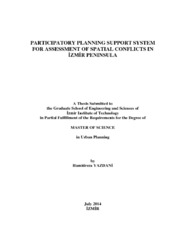Please use this identifier to cite or link to this item:
https://hdl.handle.net/11147/4170Full metadata record
| DC Field | Value | Language |
|---|---|---|
| dc.contributor.advisor | Saygin, Mustafa Ömür | |
| dc.contributor.author | Yazdani, Hamidreza | - |
| dc.date.accessioned | 2014-11-17T12:40:47Z | |
| dc.date.available | 2014-11-17T12:40:47Z | |
| dc.date.issued | 2014 | |
| dc.identifier.uri | http://hdl.handle.net/11147/4170 | |
| dc.description | Thesis (Master)--Izmir Institute of Technology, City and Regional Planning, Izmir, 2014 | en_US |
| dc.description | Includes bibliographical references (leaves: 132-139) | en_US |
| dc.description | Text in English; Abstract: Turkish and English | en_US |
| dc.description | x, 139 leaves | en_US |
| dc.description.abstract | Development strategies and their possible impacts over time as a consequences of proposed spatial development are one of the main concerns of planners in planning process. Understanding the impact of these changes on environment and balanced management to distribute resources are essential indicators for planning approach aiming to achieve the sustainable development. A precise, accurate and up-to-date data in addition to reliable spatial analysis are basic requirements of sustainable decision making. A Planning support system (PSS) is mainly based on collecting, monitoring, analyzing data and evaluating the impacts of alternative planning scenarios using Geographical Information Systems (GIS) for contributing spatial decisions. This study offers an approach to evaluate possible conflicts between development strategies in an environmentally sensitive areas. The approach is based on a PSS which integrated collaboratively weighted scenarios and natural assets. The study identify a framework for Co-production of data, evaluation of model outcomes and ranking natural and regional assets in cooperation of interest groups by utilizing Delphi survey in a conflict model of Esri ArcGIS. This model reveals impact level of development strategies on environmentally sensitive area and geographically map the conflicts of these strategies on each other and nature. The outcomes of model assist decision makers to produce alternative approaches for sensitive areas where conflicts of different polices are inevitable. Additionally the model utilize public participation in both gathering data and evaluating spatial analysis. This lead to a more adoptable planning practice where planners reach to public knowledge about region and guaranty guaranty consensuses in spatial decision making. | en_US |
| dc.language.iso | en | en_US |
| dc.publisher | Izmir Institute of Technology | en_US |
| dc.rights | info:eu-repo/semantics/openAccess | en_US |
| dc.subject | Sustainability | en_US |
| dc.subject | Public participation | en_US |
| dc.subject | Decision Support System | en_US |
| dc.subject | Planning Support System | en_US |
| dc.subject | GIS | en_US |
| dc.title | Participatory planning support system for assessment of spatial conflicts in Izmir Peninsula | en_US |
| dc.title.alternative | Mekansal çakışmaların değerlendirmesinde katılımcı planlanma karar verme destek sistemi: İzmir Yarımada örneği | en_US |
| dc.type | Master Thesis | en_US |
| dc.authorid | TR115449 | en_US |
| dc.institutionauthor | Yazdani, Hamidreza | - |
| dc.department | Thesis (Master)--İzmir Institute of Technology, City and Regional Planning | en_US |
| dc.relation.publicationcategory | Tez | en_US |
| item.fulltext | With Fulltext | - |
| item.grantfulltext | open | - |
| item.languageiso639-1 | en | - |
| item.openairecristype | http://purl.org/coar/resource_type/c_18cf | - |
| item.cerifentitytype | Publications | - |
| item.openairetype | Master Thesis | - |
| Appears in Collections: | Master Degree / Yüksek Lisans Tezleri Sürdürülebilir Yeşil Kampüs Koleksiyonu / Sustainable Green Campus Collection | |
Files in This Item:
| File | Description | Size | Format | |
|---|---|---|---|---|
| 10013670.pdf | MasterThesis | 8.46 MB | Adobe PDF |  View/Open |
CORE Recommender
Page view(s)
212
checked on Nov 18, 2024
Download(s)
90
checked on Nov 18, 2024
Google ScholarTM
Check
Items in GCRIS Repository are protected by copyright, with all rights reserved, unless otherwise indicated.